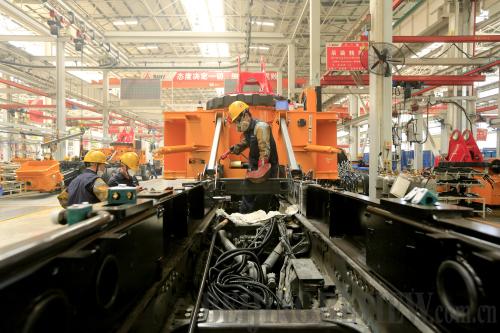|
 |
|
MACHINERY GIANT: Employees work on the construction machinery at an assembly shop of Sany Heavy Industry Co. in Changsha, Hunan Province on July 12 (CFP) |
Xiao Shunwu, an associate professor at Southwest University of Political Science and Law, also said Sany has a slim chance of winning its case.
"If a U.S. company sues president Obama, it may win. But it will be extremely difficult for a Chinese company to win such a case. In a country with the most advanced jury system, the U.S. citizens, who are currently mired in an economic crisis, are apt to rule against the interests of foreign companies."
Chinese investment in the United States has been blocked before on grounds of "national security."
In 2009, CFIUS forced the Chinese-owned Nonferrous International Investment Co. to backtrack on a proposal to buy Nevada-based Firstgold, whose properties were close to a naval air station.
And in 2011, Chinese telecom maker Huawei had to relinquish plans to buy some assets from U.S. server technology firm 3Leaf after CFIUS ordered Huawei to give up some parts of the deal.
Recently, the U.S. House of Representatives Intelligence Committee issued a report alleging that Huawei and ZTE, another Chinese hi-tech company, posed a possible threat to U.S. national security.
The report recommended that regulators block Huawei and ZTE from acquiring U.S. companies, adding that government computer systems should not include components made by the two companies on fear they "might pose an espionage risk."
However, a White House-ordered review of possible security risks found no evidence that either company had been involved in spying.
Niu Xinchun, Vice President of the Institute of American Studies at the China Institutes of Contemporary International Relations, said there is a tendency for U.S. politicians to believe that "whatever the reason, being tough on China is safe."
Although the chances of Sany winning the case are slim, it signals a new era for Chinese companies seeking to protect their interests in overseas markets through legal means, experts said.
They also warned that the case could have consequences on Chinese investment in the United States.
"Ours is a relatively small case, but it connects to the fundamental faith of thousands of Chinese investors," Wu said.
Blocking investment from China will hurt the United States more than China, said Shen Danyang, spokesman of the Ministry of Commerce on October 19.
"Such moves will hurt bilateral trade ties. In fact, China's investment to the United States grew the slowest among China's major trade partners in the first nine months of the year," said Shen.
From January to September 2012, Chinese companies' outbound investment to the United States increased by 14.3 percent year on year, much lower than the average growth rate of 40 to 50 percent, according to data from the ministry.
"We hope the U.S. judicial departments will handle the lawsuit fairly, justly and publicly," Shen said.
The ministry hopes the U.S. side will refrain from politicizing trade issues and resume business as usual, he said.
Hao Junbo, a claims and litigation expert, said Chinese companies used to back away from international disputes.
"As a lawyer for Chinese companies, I know they would often react passively when their interests were challenged," Hao said.
"Sany is the first, but it will not be the last. Chinese companies are increasingly confident in dealing with legal issues," he said.
Sany Group
Sany Group is a global company in the construction machinery industry with a vast product range of concrete machinery, excavators, crawler cranes, truck cranes, pile driving machinery, road construction equipment, port machinery, and wind turbine.
As the parent company of Shanghai-listed Sany Heavy Industry Co., China's largest construction equipment maker, the group is owned by Chairman Liang Wengen, China's fifth richest man according to the latest ranking by the Hurun Report.
Established in 1989, the group now employs about 50,000 people in more than 150 countries, with a total sales revenue of 80.2 billion yuan ($12.73 billion) in 2011.
Email us at: zhouxiaoyan@bjreview.com | 